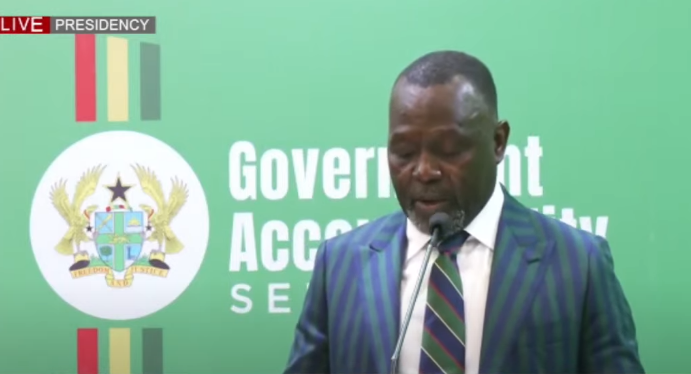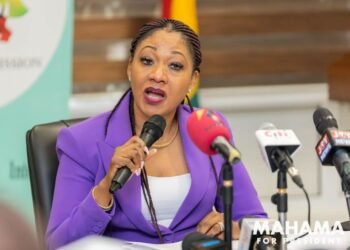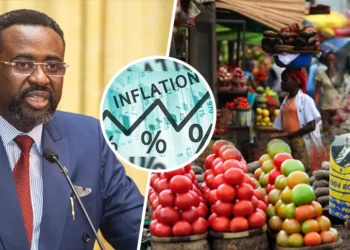The ongoing UniBank case has taken a new turn as Attorney General Dr. Dominic Ayine has publicly addressed growing concerns over the asset recovery strategy, reaffirming that the resolution plan was both lawful and pragmatic.
In his view, it offered the best route toward retrieving lost funds without prolonging litigation.
Speaking during the Government Accountability Series on Monday, July 28, 2025, Dr. Ayine emphasized his commitment to transparency.
He explained that the confusion surrounding the recent nolle prosequi filing—where charges were dropped in the criminal case—stemmed from misunderstandings about the figures involved and the motives behind the settlement.
“My fellow countrymen and women, in March, the lawyers for the Unibank directors and shareholders approached me with a proposal of their client’s intention to settle their indebtedness to Unibank. In response, I convened a meeting on March 25 with them.
“At the meeting, it became obvious to both parties that a reconciliation of Unibank’s account with the Bank of Ghana should be conducted.”
Dr. Dominic Ayine
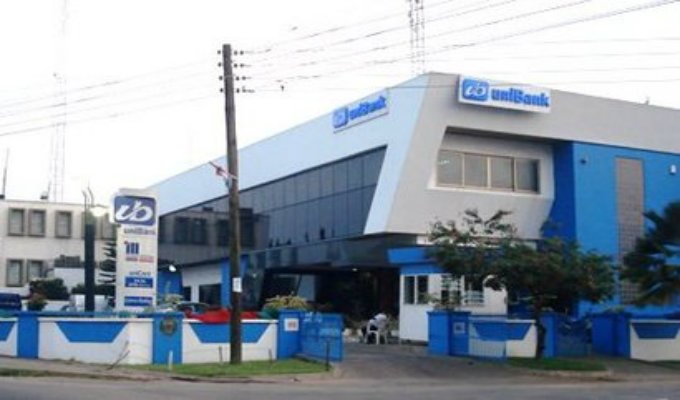
Dr. Ayine explained that both civil and criminal cases against the accused were interrelated, and thus, any comprehensive resolution had to account for both.
He authorized a reconciliation process that would determine the full extent of UniBank’s exposure. “The objective was to assess the feasibility of a comprehensive settlement.”
The criminal case involved GHS 1.2 billion, while the civil suit originally sought GHS 5.7 billion.
However, this amount was revised down to GHS 2.8 billion after further investigations and reconciliations.
Overlap In Unibank Liability Figures Clarified
Dr. Dominic Ayine further clarified that the GHS 1.2 billion from the criminal case was not in addition to the GHS 2.8 billion civil liability but part of it.
A breakdown of the original civil claim showed GHS 2 billion as loans and advances to related parties and GHS 3.7 billion in payments made under the instructions of the accused.
Within these figures, GHS 2.1 billion was flagged as fictitious—essentially accounting entries that did not involve actual money transfers.
According to Dr. Ayine, the accused objected to the inclusion of this fictitious amount, arguing that it did not reflect any recoverable cash.
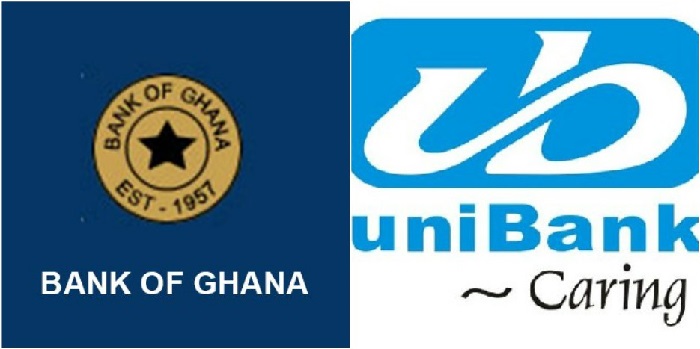
They also contested the inclusion of a GHS 300 million placement with Unise Securities, a now-liquidated entity regulated by the Securities and Exchange Commission. That money, however, is being pursued separately through insolvency proceedings.
“After prolonged negotiations, the accused persons, by a letter dated 7th May 2025, proposed to settle the revised outstanding obligation of GHS 3,300,000,000.0 through a structured approach.
“The accused persons offered to pay GHS 2,000,000,000 in full and final settlement of the outstanding obligations through the following arrangements: 800,000,000 worth of assets to be transferred directly to UniBank, which is in receivership, and which will be made available to the Bank of Ghana.”
Dr. Dominic Ayine
He also revealed that the accused committed to assisting the receiver in recovering another GHS 1.2 billion from beneficiaries who received funds at their instruction.
So far, the Attorney General noted that GHS 824 million in real estate has already been provided, and about GHS 500 million has been recovered from the targeted GHS 1.2 billion. The remainder is expected to be recouped over the next 18 months.
Although a full cash payment would have been ideal, Dr. Ayine acknowledged that it was unrealistic. He emphasized that the accused were not financially positioned to pay the amount outright.
“The fictitious GHS 2.1 billion never left the bank—it was simply a book entry aimed at creating a positive illusion of UniBank’s financial state,” Dr. Ayine said, explaining the rationale behind the criminal charge of falsification of accounts.
He also pointed out that the GHS 300 million placed with Unise Securities is still under claim in an ongoing insolvency case, with recovery still actively pursued.
Civil Route Preferred In Unibank Asset Recovery
The Attorney General also noted that after six years of legal proceedings, there has been little progress on recovery.
He criticized those who initiated the criminal case for failing to pursue asset tracing or initiate recovery efforts.
According to him, the civil route offers the most viable path to recovering value for the state, especially when litigation costs, time delays, and risk of asset concealment are factored in.

Dr. Ayine stated that under the new plan, oversight will be maintained by his office, the Bank of Ghana, and the Ministry of Finance. Regular quarterly reviews will monitor compliance and progress in asset realization.
The Attorney General concluded that although punitive justice is critical, practical recovery of funds through UniBank asset recovery mechanisms is ultimately what benefits the country.
“The current arrangement secures the timely resolution or recovery of GHS 800 million in assets and outlines a clear path for retrieving an additional GHS 1.2 billion, without the risks of endless court battles.”
Dr. Dominic Ayine
Consequently, he emphasized the underlying economic reasoning that justified adopting this approach, stressing that it offered a more efficient, timely, and financially sound path toward recovering significant public funds.
READ ALSO: Family Opens Condolence Book for Daddy Lumba

